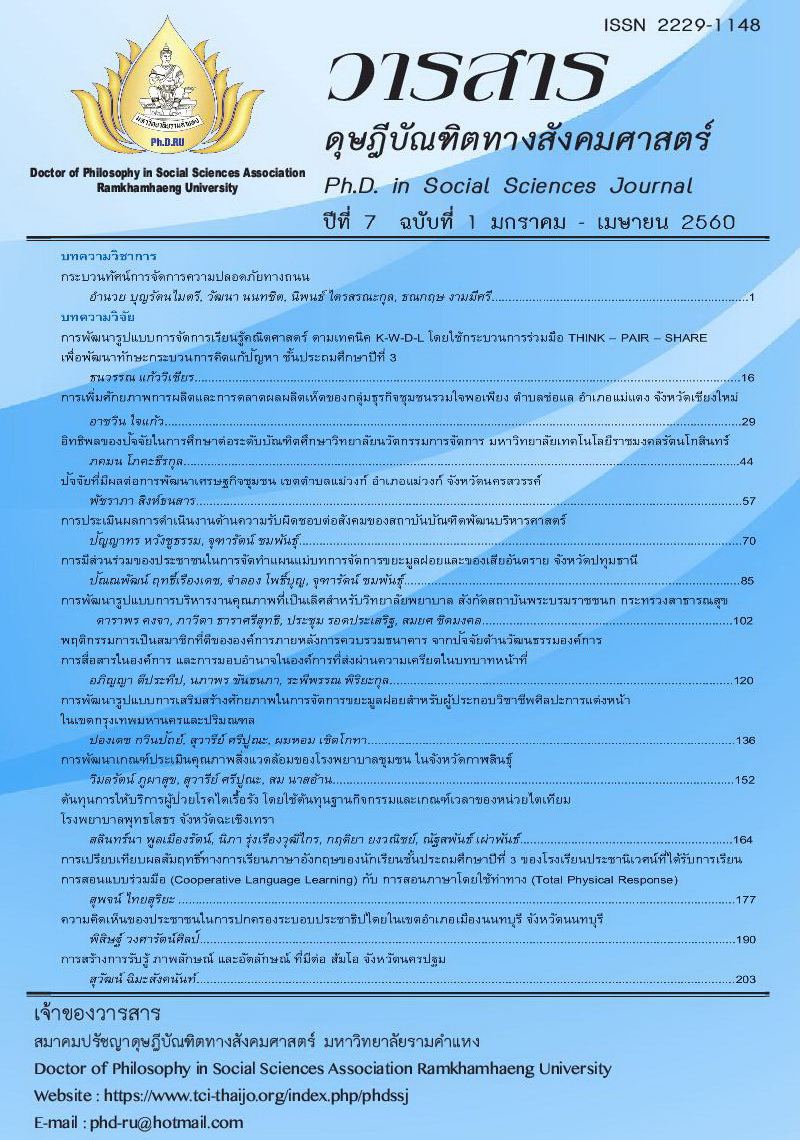การประเมินผลการดำเนินงานด้านความรับผิดชอบต่อสังคม ของสถาบันบัณฑิตพัฒนบริหารศาสตร์
Main Article Content
Abstract
สถาบันบัณฑิตพัฒนบริหารศาสตร์เป็นสถาบันการศึกษาระดับอุดมศึกษาที่มีการดำเนินงานด้านความรับผิดชอบต่อสังคมยาวนานและมีประสิทธิภาพ จึงควรมีการศึกษาถึงแนวทางการดำเนินงานที่ประสบความสำเร็จ งานวิจัยนี้มีวัตถุประสงค์เพื่อศึกษาแนวทางการดำเนินงาน ประเมินผลการดำเนินงาน รวมถึงปัญหาและอุปสรรคที่มีผลต่อการดำเนินงานด้านความรับผิดชอบต่อสังคมขององค์กร เสนอแนะแนวทางพัฒนาการดำเนินงานดังกล่าว งานวิจัยนี้เป็นงานวิจัยเชิงคุณภาพ ใช้หลักการประเมินผลเชิงดุลยภาพ ในการศึกษา เก็บรวมรวมข้อมูลโดยการสัมภาษณ์แบบกึ่งโครงสร้างกับผู้ให้ข้อมูลหลัก ร่วมกับการสังเกตการณ์แบบมีส่วนร่วม ผลการศึกษาพบว่า มิติด้านการเงิน สถาบันฯ มีการจัดสรรงบประมาณได้ตรงตามวัตถุประสงค์และเป้าหมายเป็นอย่างดี มิติด้านกระบวนการภายใน สถาบันฯ กำหนดยุทธศาสตร์เรื่องความรับผิดชอบต่อสังคมเป็นหนึ่งในยุทธศาสตร์หลัก มีการกำหนดผู้บริหาร หน่วยงานรับผิดชอบอย่างชัดเจนทำให้การดำเนินงานเป็นไปอย่างเรียบร้อย มิติด้านลูกค้า ผู้มีส่วนได้ส่วนเสียส่วนใหญ่มีความพึงพอใจต่อการดำเนินงานด้านความรับผิดชอบต่อสังคม มิติด้านการเรียนรู้และพัฒนา บุคลากรผู้เข้าร่วมโครงการเป็นผู้ที่มีความตระหนักและจิตสำนึกที่ดี หรือเคยผ่านงานด้านความรับผิดชอบต่อสังคมมาก่อน ส่งผลให้ไม่ต้องมีการพัฒนาการเรียนรู้เพิ่มมากนัก ส่วนข้อเสนอแนะต่อการดำเนินงาน พบว่า สถาบันฯ ควรเพิ่มจำนวนผู้รับผิดชอบการดำเนินงานด้านความรับผิดชอบต่อสังคม และริเริ่มโครงการด้านความรับผิดชอบต่อสังคมตามองค์ความรู้หลักของแต่ละคณะและหน่วยงานมากขึ้น
EVALUATION OF THE CORPORATE SOCIAL RESPONSIBILITY PERFORMANCE AT THE NATIONAL INSTITUTE OF DEVELOPMENT ADMINISTRATION (NIDA)
The National Institute of Development Administration (NIDA) is one of Thailand’s higher education institutions, with a long history of efficient corporate social responsibility. The success of its implementation is an interesting topic for study, and thus, the present research is aims at investigating the implementation and the success of the institute’s corporate social responsibility performance, finding its problems and obstacles, and making suggestions for improvement. This qualitative study employed a balanced scorecard, and data were collected via Semi-structured interviews with key informants and participant observations. With regards to the financial perspective, the institute allocates budgets that correspond to their objectives and goals efficiently. In terms of the internal business process, there is an institutional strategy for corporate social responsibility; the institute assigns a specific group of staff members to be directly responsible for corporate social responsibility, coupled with close supervision by an administrator, enabling smooth implementation. For customer perspective, it was found that most of the stakeholders were satisfied with the institute’s corporate social responsibility performance. Finally, in terms of the learning and growth perspective, there is little need for training and development, since all of the staff members in charge had experience related to corporate social responsibility. For the improvement of the institute’s corporate social responsibility performance, it is suggested that NIDA should increase the number of personnel for greater efficiency and the initiation of corporate social responsibility projects that correspond directly to individual schools and divisions.
Article Details
Academic articles, research articles, and book reviews in the Ph.D. in Social Sciences Journal are author’s opinions, and not the publisher’s, and is not the responsibility of the Ph.D. in Social Sciences Journal Philosophy Association, Ramkhamhaeng University. (In the case that research is done on human, the researcher has to be trained in Ethics for Doing Research on Human Training and has to produce the evidence of the training).


